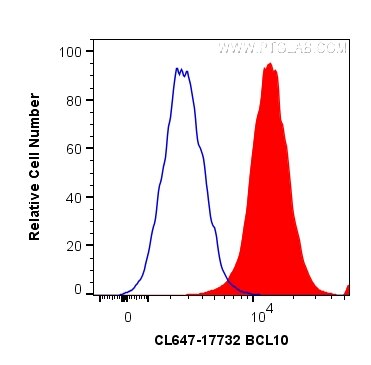Tested Applications
| Positive FC (Intra) detected in | Jurkat cells |
Recommended dilution
| Application | Dilution |
|---|---|
| Flow Cytometry (FC) (INTRA) | FC (INTRA) : 0.20 ug per 10^6 cells in a 100 µl suspension |
| It is recommended that this reagent should be titrated in each testing system to obtain optimal results. | |
| Sample-dependent, Check data in validation data gallery. | |
Product Information
CL647-17732 targets BCL10 in FC (Intra) applications and shows reactivity with human, mouse, rat samples.
| Tested Reactivity | human, mouse, rat |
| Host / Isotype | Rabbit / IgG |
| Class | Polyclonal |
| Type | Antibody |
| Immunogen | BCL10 fusion protein Ag12170 Predict reactive species |
| Full Name | B-cell CLL/lymphoma 10 |
| Calculated Molecular Weight | 233 aa, 26 kDa |
| Observed Molecular Weight | 30 kDa |
| GenBank Accession Number | BC053617 |
| Gene Symbol | BCL10 |
| Gene ID (NCBI) | 8915 |
| RRID | AB_2934928 |
| Conjugate | CoraLite® Plus 647 Fluorescent Dye |
| Excitation/Emission Maxima Wavelengths | 654 nm / 674 nm |
| Form | Liquid |
| Purification Method | Antigen affinity purification |
| UNIPROT ID | O95999 |
| Storage Buffer | PBS with 50% glycerol, 0.05% Proclin300, 0.5% BSA, pH 7.3. |
| Storage Conditions | Store at -20°C. Avoid exposure to light. Stable for one year after shipment. Aliquoting is unnecessary for -20oC storage. |
Background Information
The gene encoding BCL10 was identified by its recurrent translocation t(1;14)(p22;q32) in a case of mucosa-associated lymphoid tissue (MALT) lymphoma. BCL10 contains a caspase recruitment domain (CARD), and has been shown to induce apoptosis and to activate NF-kappaB.
Protocols
| Product Specific Protocols | |
|---|---|
| FC protocol for CL Plus 647 BCL10 antibody CL647-17732 | Download protocol |
| Standard Protocols | |
|---|---|
| Click here to view our Standard Protocols |



